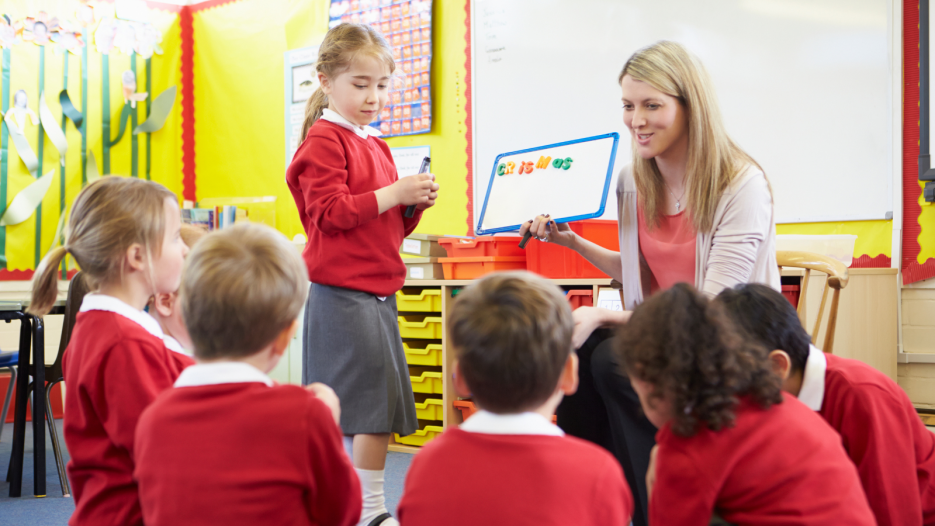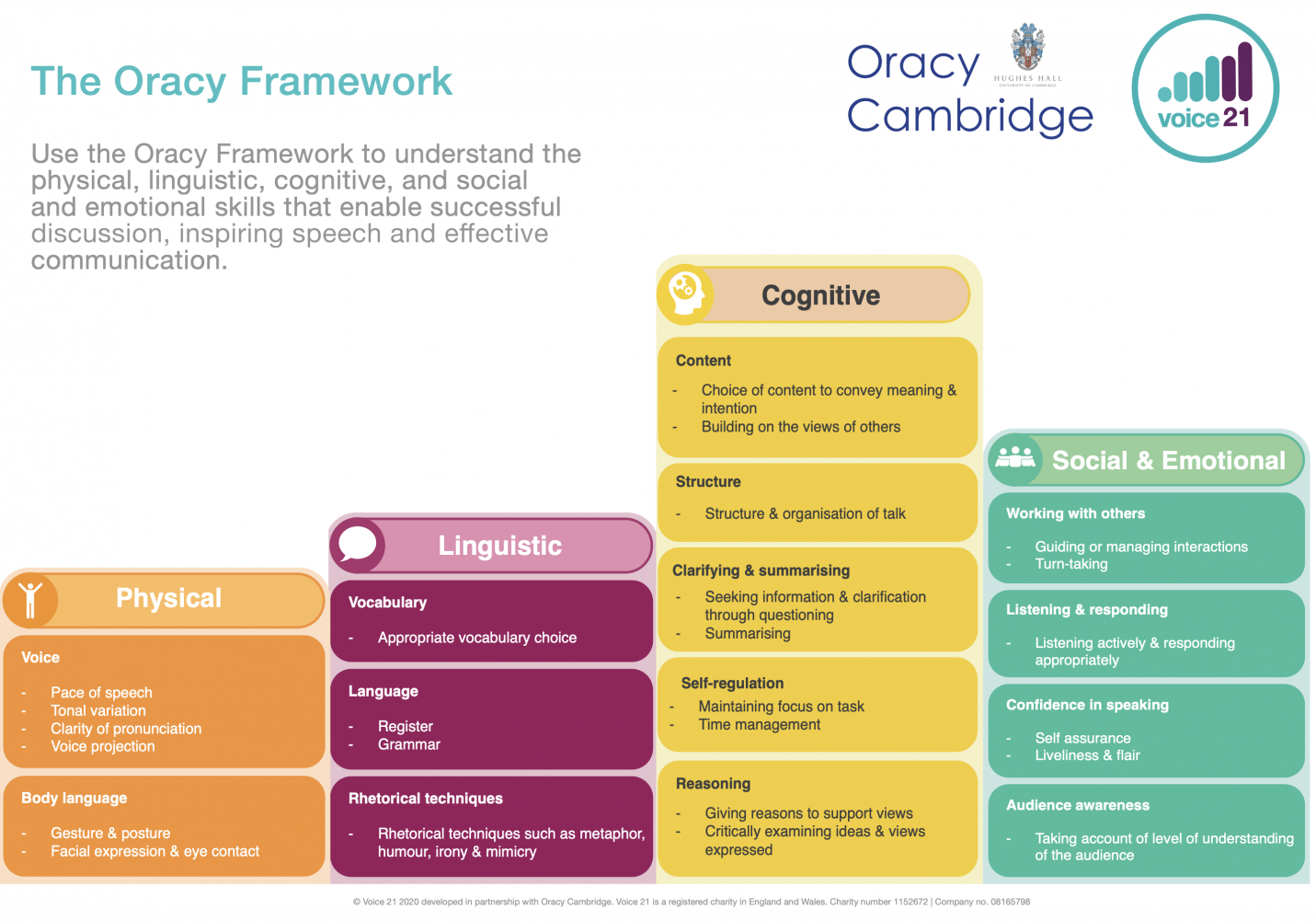Last updated July 8th, 2024 by Admin
Whether you have just stepped into the classroom or you are looking to brush up on your knowledge of oracy in schools, this post will provide you with everything you need to know, covering the following areas:
- What is Oracy?
- Oracy & The National Curriculum
- Oracy & Ofsted - what are Ofsted looking for?
What is Oracy?
Oracy refers to the ability to communicate effectively through speech. It involves using language to express thoughts, ideas, and feelings, and to interact with others in a way that is clear, coherent, and appropriate.
Initially it appears straight forward, and many argue that oracy is already included in the 'Speaking and Listening' part of the curriculum, however modern day education is beginning to make us realise that oracy is much more than simply being able to put your hand up and answer a question. Instead it is better described as a set of skills, including physical, linguistic, and social and emotional abilities. With recent alk from exam boards about oracy neglect leaving pupils struggling we're seeing it come up more frequently in the news and the education sphere.
This is outlined by Voice21's Oracy Framework, which demonstrates the difference between being able to project your voice to the back of a room (physical), structuring your speech and conveying your meaning (cognitive) and being aware of your audience and their level of understanding (social and emotional).
Oracy is particularly important in the wake of the pandemic, teachers are witnessing gaps in some students' capabilities to work as a team and communicate effectively, from early years to graduate level. This has therefore placed more weight on teaching oracy and therefore our responsibility to provide students with enough opportunities to strengthen their spoken language skills in order to communicate, think critically, succeed academically, socially and prepare for their future careers. Labour leader Kier Starmer says it is 'key to doing well in a job interview, persuading a business to give you a refund, telling your friend something awkward. Oracy is a skill that can and must be taught.'
On top of that, the development and use of spoken communication skills (oracy) is an essential part of language learning in the UK National Curriculum. The curriculum outlines specific skills that students should acquire at different stages of their education, including listening, speaking, presenting, and debating. As such, oracy is not only important for the development of students but also for the wider performance and success of schools. Sounds pretty important, right? Don’t worry, we’re going to show you how to improve oracy in the classroom, one conversation at a time.
Oracy & The National Curriculum
The beginning of the National Curriculum says, ‘fluency in the English language is an essential foundation for success in all subjects’ and therefore it is crucial to embed oracy throughout the whole curriculum; however, without having Oracy as an explicit part of the curriculum are we running the risk of not giving it the weight that is deserves (especially if we're realistic about the current tick box nature of teaching)?
Before getting into number 10, Keir Starmer stated in July 2023 that the curriculum doesn't currently allow us to provide pupils with the opportunity to master speaking well and expressing themselves. He stated: 'This is short-sighted. An inability to articulate your thoughts fluently is a key barrier to getting on and thriving in life.' To address this, the new Labour government has pledged to fund evidence-based early-language interventions in primary schools, highlighting the importance of developing early communication skills to ensure every child can find their voice and mitigate the serious consequences of delayed development.
Whilst the Labour Government are settling in, we are here to analyse the current curriculum for you and give a teacher's perspective on how you can enhance classroom talk and give your pupil's the opportunity to thrive in oracy.
Oracy is referred to in the English curriculum, which states that pupils should be taught to 'speak clearly, fluently and with confidence in any situation, including presenting and debating.' The curriculum also mentions a focus on listening and understanding, stating that pupils should be able to 'listen and respond appropriately to others, including in group discussion, taking turns and building on the contributions of others.' This includes the ability to ask relevant questions, express opinions and explain ideas. In addition, the curriculum emphasises the importance of developing a wide vocabulary, using grammar correctly and adapting speech for different purposes and audiences.
It is worth noting that although speaking and listening is without a doubt a crucial aspect of everyday education, oracy is an area of the curriculum that is not formally assessed. Therefore, when it comes to the pressures of meeting targets there is always the risk that oracy falls to the bottom of the list of priorities. With this in mind, let's take a closer look at exactly what the curriculum says:
At Key Stage 1 (KS1) (ages 5-7):

In KS1 (Year 1 & 2) pupils should be taught the following skills with regards to speaking & listening / oracy:
-
Listen and respond appropriately to others
-
Ask relevant questions to extend their understanding and knowledge
-
Articulate and justify answers, arguments, and opinions
-
Give well-structured descriptions and explanations
At Key Stage 2 (KS2) & Key Stage 3 (KS3) (ages 7-14):

In KS2 (Year 3 to 6) pupils should be taught the following skills with regards to speaking & listening / oracy:
-
Listen and respond appropriately to others
-
Ask relevant questions to extend their understanding and knowledge
-
Articulate and justify answers, arguments, and opinions
-
Give well-structured descriptions and explanations
-
Participate in discussions, presentations, performances, and debates
-
Adapt their language to suit different purposes and audiences
-
Speak fluently and confidently in a range of contexts
At Key Stage 4 (KS4) (ages 14-16):

Pupils continue to develop their oracy skills through the study of English Language and Literature in KS4. The curriculum requires pupils to analyse, evaluate, and respond to a wide range of spoken and written texts, as well as to communicate their own ideas effectively.
Oracy & Ofsted - what are Ofsted looking for?
As we’ve already mentioned, oracy is an essential part of the education system and the overall development of pupils, but you may be wondering what our friends at Ofsted have to say about it?
In 2021 The Centre for Education & Youth found that Ofsted's reporting does not give substantial emphasis to oracy. However, Ofsted do have some key indicators that they look for in relation to oracy, which we have outlined below:
1. Quality of talk:
Ofsted evaluates classroom talk, considering the interactions between students and teachers, as well as among students. They look for talk that is challenging, stimulating, and promotes thinking and learning.
2. Range and depth of vocabulary:
They also assess the range and depth of students' vocabulary, including the use of academic language, subject-specific terms, and expressing complex ideas.
3. Listening skills:
Listening skills are examined, including active listening, responding to others, and understanding instructions and information.
4. Presentation skills:
Presentation skills are also evaluated, such as clear, confident, and effective speaking, along with appropriate non-verbal communication.
5. Cultural competence:
Ofsted assesses students' cultural competence in oracy, including effective communication with people from diverse backgrounds and cultures.
While this gives us as teachers a small insight into what Ofsted are looking for in terms of oracy, information about how Ofsted inspects these areas is sparse
If we refer to the famous leaked oftsed cribsheets, its interesting to note that there isn't a cribsheet for oracy, but instead oracy is embedded into many different subject's cribsheet. such as this line, taken from page 6 of the Secondary English cribsheet: "Know-how to use words deliberately and purposefully to achieve coherence and fluency."
Perhaps this lack of clarity explains why Kier Starmer has committed to making oracy explicit in the curriculum, and why so many teachers were insulted by the suggestion that oracy is not already intertwined into everything that we do as teachers.
Looking to improve oracy in your school?
VotesforSchools provides award-winning weekly resources to prompt discussion on a challenging current issue. We're known for empowering young voices, building oracy, confidence and critical thinking.
We use VFS to develop oracy. We run two sessions of VFS per week. In the first session students are given the content (still alot of independent discussion). In the second session the students write a 2 minute speech using sentence starters (see the second to last slide I have added to your PowerPoint). Then in that session 4 students stand in front of the class, give their speeches to try and influence other students perception of the topic. The tutor group then votes. We have had quite a few local Schools/academies come at look at this and thought it was brilliant. We have included in our planners (that all students carry round with them every day) a VFS section, which includes a template to write each weeks speech.Andy Hopkin, Vice Principal, Wath Academy



